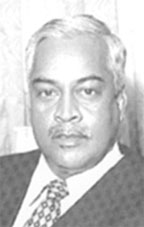–lawyers fear threat to independence
The parliamentary debate of a controversial new law that would license lawyers through the tax commissioner has been deferred for at least a week, to allow more consultations.

Attorney General and Legal Affairs Minister Charles Ramson on Thursday asked that the second reading of the Legal Practitioners (Amendment) Bill 2009 be deferred for at least a week. The bill has attracted the wrath of some members of the legal fraternity, who are objecting to a provision which proposes that an attorney may not practice unless he or she is first issued with a practice provision by the Commissioner General of the Guyana Revenue Authority. Members of the Bar are also complaining that they were not consulted on the legislation.
The bill has been touted as a piece of legislation which is intended to enhance the regulation of the legal profession and strengthen the powers of the Legal Practitioners Committee in relation to the discipline of attorneys-at-law. Coming on the heels of the recent allegations of a teen murder suspect being tortured while in police custody, the bill outlines the procedure attorneys should follow in addressing such complaints.
According to Rule XV (2) of Clause 34 of the bill, “an attorney-at-law shall not practice as an attorney-at-law unless he has been issued a practice certificate by the Commissioner General in accordance with the provisions of section 39 of the Tax Act.”
This provision falls under the proposed Code of Conduct which is expected to regulate the conduct of attorneys-at-law. Attorney and PNCR-1G MP Basil Williams told Stabroek News on Tuesday that while he was in support of the legislation generally, he could not agree with the proposed provision in Clause 34, which he said intends to give one individual the authority to decide who can practice or not. Williams dubbed it a “repressive move” by the government and he suggested that it was slid into the legislation in such a way that it would go undetected. He said that should the particular provision be included, the independence of lawyers would be seriously threatened.

Head of the Guyana Bar Association (GBA) Teni Housty said that the new provision was a matter of concern to him. He said he was unaware of such a provision in any other Legal Practitioners Act and added that in countries where a practicing licence is issued, it is the parent body for the lawyers that is responsible for issuance.
Housty also expressed his concern at the manner in which the bill was tabled and said that no proper consultation was done with the Bar Association, prior to it being laid before the National Assembly.
According to him, an early version of the bill was circulated to the Bar Association in early 2008, and the association made some comments for improvement. He said that there were some “reservations at the first manifestation of the bill” but no discussions were held after the initial communication. He said the GBA was not presented with the proposed legislation and had no idea that the administration was moving to have it laid before the National Assembly.
Stranglehold
Meanwhile, the PNCR at its press conference on Thursday said that “the bill represents an attempt, by this Jagdeo Administration to effect a stranglehold on the legal profession of Guyana.” The party said that “it is unfortunate that a Bill as controversial as this was virtually sneaked into the National Assembly by way a Supplementary Order Paper, on Thursday 26 November 2009.” According to the party “the reality is that most MPs were only able to read the Bill last weekend.” “Of even greater concern is that members of the Legal profession were not given a copy of the Bill as now Tabled, therefore, they have not been able to make their views known or their voices heard,” the party added.

According to the party, “the most important aspect of this legislation is the unconstitutional provision which dictates that an Attorney-at-Law cannot practice his/her profession without first obtaining a Tax Practice Certificate from the Commissioner General of the Guyana Revenue Authority.” The party said that “a Tax Practice Certificate is a requirement under section 39 of the Tax Act. Non compliance with this requirement has its own regime of penalties under the Income Tax Act.” The party noted that “the present Bill would effectively deny an Attorney-at-Law the right to practice his/her profession in the absence of this Certificate. This is not only tantamount to double jeopardy, but infringes a person’s Constitutional right to work.”
The PNCR said that the bill is also “an effort to undermine the Independence of the Judiciary when the Chancellor of the Judiciary (the head of the Bench) selects the 12 members of the Bar (after consultation with the Bar Association) who shall sit on the Legal Practitioners Committee, which is the Disciplinary Committee for the members of the Bar.”
Torture
Meanwhile, in cases where someone alleges that acts of torture or inhuman treatment were meted out to them while in lawful custody, the bill proposes that the person’s attorney “be prepared to raise such allegations before the competent authorities, unless instructed to the contrary by his client.” According to the bill, the lawyer “should take a detailed statement from his client” and present to the court “all evidence or information to substantiate the allegations and the use of all procedures available to obtain protection and an appropriate remedy for his client.”
The bill also says that a prosecutor has a personal duty to introduce as evidence in any proceedings “only those statements which he honestly believes are freely made and obtained without the use of torture or other cruel, inhuman or degrading treatment or punishment.
In case of any doubt, the prosecution must reject the statement.”
Additionally, the bill says “attorneys-at-law in government service should do all they can in their official capacity to promote the incorporation of the Standard Minimum Rules for the Treatment of Prisoners into the law of the jurisdiction.” Additionally, they are “to see that the rules and all standards relating to the treatment of detained persons are observed and enforced” and that violations are subject to disciplinary action or criminal prosecution.
Further, “Those affected by this rule have an obligation to inform the proper national and international bodies of these activities, which are in direct contravention of the provisions of this rule, and in gross violation of human rights, as described in the United Nations Declaration on the Protection of All Persons From Being Subjected to Torture and Other Cruel, Inhuman or Degrading Treatment of Punishment.” The law proposes that the information is made public only as a last resort. (Mark McGowan)
